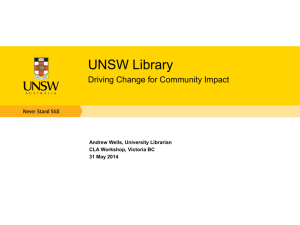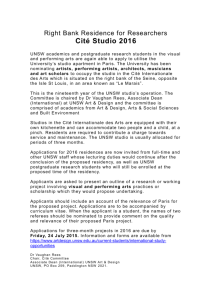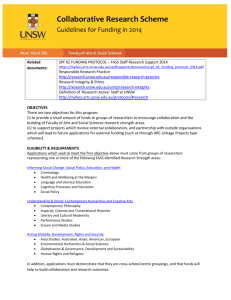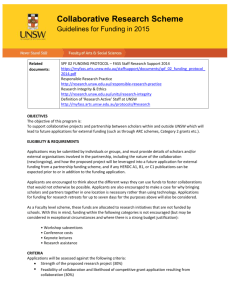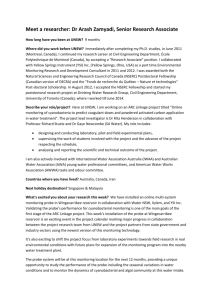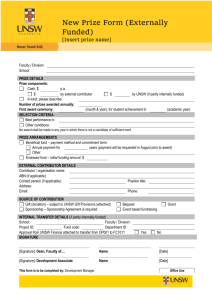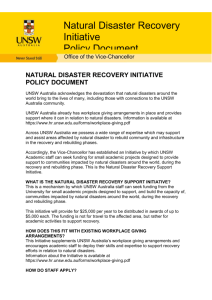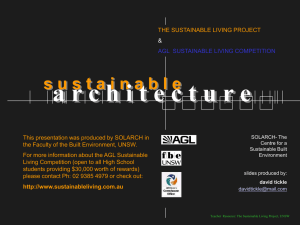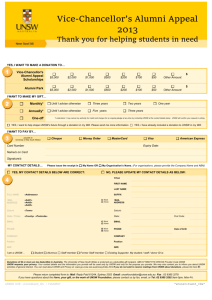research asociate in gilbert + tobin centre of public law faculty of law
advertisement
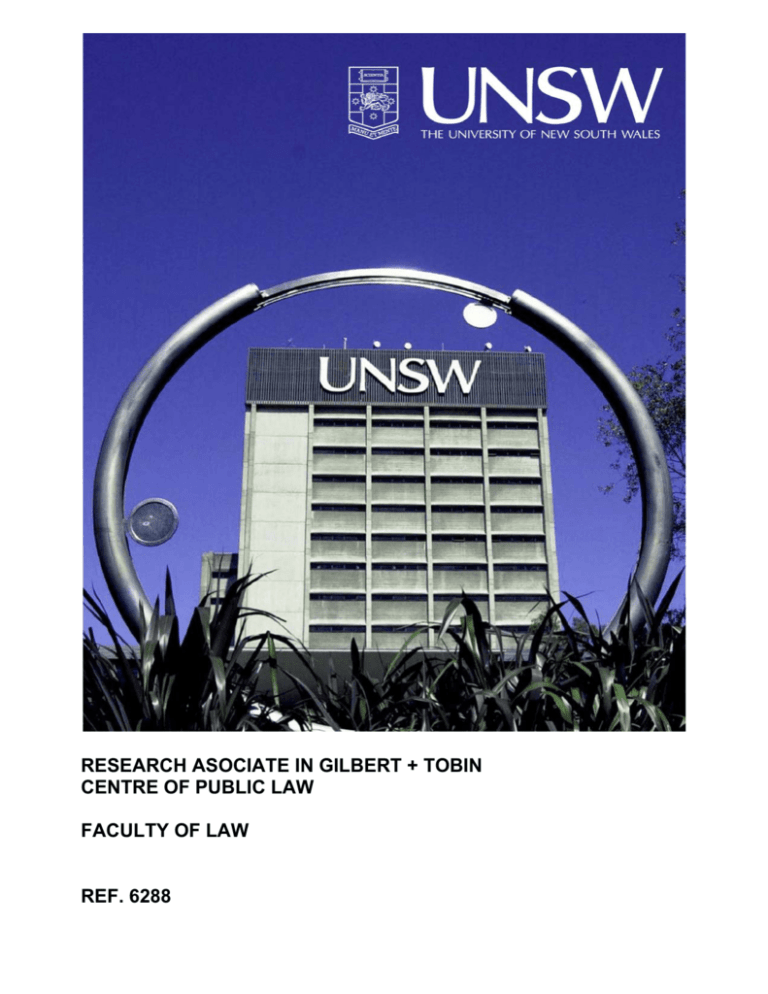
RESEARCH ASOCIATE IN GILBERT + TOBIN CENTRE OF PUBLIC LAW FACULTY OF LAW REF. 6288 Research Associate Faculty of Law GILBERT + TOBIN CENTRE OF PUBLIC LAW REF. 6288 FIXED TERM: Salary: $69,478 per year paid pro rata (plus up to 17% employer superannuation plus leave loading.) The successful applicant will be a member of a team working on a project funded by an Australian Research Council Discovery Grant titled “Federalism for the 21st Century – A Framework for Achieving Reform and Change”, under the supervision of Associate Professor Andrew Lynch. The project will construct a framework against which proposals for federal reform may be developed. The Research Associate will have responsibility for assisting the four Chief Investigators on research which forms part of the project as well as conducting research independently on certain aspects of the project themselves. The Research Associate will be located within the Gilbert + Tobin Centre of Public Law, at the Faculty of Law, University of New South Wales. This is a full-time fixed term position available for 3 years from time of appointment. Applicants should systematically address the selection criteria in their application. If having read the documentation, you have any enquiries regarding this position, please contact . Associate Professor Andrew Lynch on a.lynch@unsw.edu.au or (61 2) 9385 9654. Further information on the Faculty of Law and The Gilbert + Tobin Centre of Public Law can be found at www.law.unsw.edu.au and www.gtcentre.unsw.edu.au respectively. Applications close: 12 December 2008 Position title: Research Associate School/Unit: Written by: Level: Level A, Step 7 Gilbert + Tobin Centre of Public Law Faculty/Division: Law Andrew Lynch Date: November 2008 JOB PURPOSE This fixed-term position is available under an Australian Research Council Discovery grant held by Associate Professor Andrew Lynch and Professors Greg Craven (ACU), Neil Warren and George Williams. The grant is titled “Federalism for the 21st Century – A Framework for Achieving Reform and Change” and runs from 2009-2011. The project will construct a framework against which proposals for federal reform may be developed. The Research Associate will be based in the Gilbert + Tobin Centre of Public Law, Faculty of Law, UNSW and will provide research assistance to the Chief Investigators as well as conducting additional independent and collaborative research under the grant. MAIN DUTIES The Research Associate will have both a research and an administrative role in the project. He or she will be responsible for • • • • • working with the Chief Investigators and other Centre staff on research which forms part of the project; the collection, organisation and analysis of relevant primary and secondary materials relevant to the research; conducting research independently on certain aspects of the project; dissemination of research findings in refereed academic publications, reports, submissions to inquiries and conference papers; organisation of seminars or other meetings for the purposes of the project Additionally, the appointee • • • may be engaged in contributing to the undergraduate teaching program of the Faculty of Law; will also cooperate with all health and safety policies and procedures of the university and take all reasonable care to ensure that their actions or omissions do not impact on the health and safety of others in the university; and will have knowledge of equal opportunity. Page 1 Information for candidates ENVIRONMENT Position Context The Gilbert + Tobin Centre of Public Law in the Faculty of Law plays a prominent, independent role in public debate on issues vital to Australia's future including Charters of Rights, the reconciliation process and indigenous legal issues, the challenges of responding to terrorism, and the plight of climate change ‘refugees’. The Centre is a focal point for research into and discussion of important questions of public law for the academic, professional and wider community. The Centre's Associates, Project Directors and Postgraduate Students are engaged in research, teaching, media and consultancy work and events including conferences and seminars. Reporting Relationships Supervisor’s title: Dr Andrew Lynch, Chief Investigator Positions reporting to this position (show position titles and levels): None Other relationships: (if applicable): None PRINCIPAL ACCOUNTABILITIES • • • • • Successful completion of collection, organisation and on-time provision of analysis of relevant primary and secondary materials relevant to the research; Demonstration of ability to engage in high level legal analysis; Ability to write for both legal and non-legal audiences; Ability to work both as part of a team and on own initiative; and Contribution to the general activities of the Centre. SELECTION CRITERIA Essential • Honours LLB degree; • Demonstrated ability to carry out independent legal research; • Excellent communication skills in English (oral and written); • Word processing and information technology competence; • Knowledge of OHS responsibilities and commitment to attending relevant OHS training; and • Knowledge of equal opportunity principles. Desirable • Higher degree, current enrolment for higher degree, or equivalent achievement in law or another relevant discipline; • Demonstrated research capacity or experience in constitutional law, and federal issues particularly; and • Enthusiasm for teaching at undergraduate level and previous experience in doing so. Page 2 Information for candidates INFORMATION ON THE BENEFITS OF WORKING AT UNSW Benefits of Working at UNSW The University of New South Wales (UNSW) is one of the leading teaching and research universities in Australia. Renown for the quality of its graduates and its commitment to new and creative approaches to education and research, the University motto - Scientia Manu et Mente ("Knowledge by Hand and Mind") - encapsulates the University's central philosophy of balancing the practical and the scholarly. University Environment UNSW offers a modern, dynamic and innovative teaching and learning environment with extensive social and recreational facilities. The UNSW campus is a compact yet beautiful, architecturally sophisticated setting, offering an enviable, cosmopolitan lifestyle for staff and students. Study and research facilities are comprehensive, with a widely acclaimed library network housing more than two million volumes, extensive electronic resources and access to volumes held in libraries at all major Australian research institutions. There is an award-winning bookshop on campus and a vast array of student services available. UNSW has hundreds of sport and recreational clubs and societies for staff and students including several classical music groups who perform regularly. There is also a top class gymnasium with a fully equipped weights/cardio room, indoor swimming pool and a range of classes and courts to suit all fitness needs. The UNSW campus boasts a vibrant cafe scene and is situated in the beautiful Eastern suburbs of Sydney just minutes from the famous Coogee and Bondi beaches. In addition, the local area is renowned for its large number of high quality, award winning, restaurants and cafes all of which are just minutes away. UNSW also boasts the famous National Institute of Dramatic Arts (NIDA) and the Randwick racecourse as neighbours. Employer of choice for women UNSW has been recognised for creating a work culture that supports and advances women with an Employer of Choice for Women citation. The award comes from the Equal Opportunity for Women in the Workplace Agency (EOWA). The University was acknowledged as one of only 115 organisations across Australia that actively recognise and address the needs of female workers, to assist them to reach their full potential in the workplace. University Diversity UNSW values the diverse social, economic, cultural and religious backgrounds of its employees and promotes this by providing an accessible campus environment, flexible work practices for those with family and other responsibilities or with disabilities, including training on diversity management and cross-cultural communication. Page 3 Information for candidates As an UNSW employee you will be able to enjoy a safe and non-discriminatory environment and have the same opportunities to benefit from employment as other employees. In relation to employment equity, staff can access work opportunities such as staff development and training, promotion and re-evaluation, higher duties and a suitable and safe working environment. Leave Entitlements Recreation Leave accrues at the rate of one and two-third days per month to a total entitlement of 20 days per year. Recreation leave cannot be taken in advance of its accrual. Sick Leave is granted under the following arrangements: ten days in the first year of service, 15 days in the second and 30 days in any subsequent year. Special Leave of up to three days per year may be granted in cases of emergency and unforseen circumstances e.g. fire or flood damage to your home. Applications for Special Leave must be made to the supervisor and will be considered on its merits. There is no entitlement to Special Leave if the leave sought is during a period of other leave. Observation of Holy Days and Essential Religious or Cultural Duties allows you to utilise recreation leave or long service leave or leave without pay for the purposes of attending holy days or essential religious or cultural duties associated with your particular religious faith or culture. Carer’s Leave allows you to use part of your sick leave to care for an immediate family member who is ill. Up to 10 days of sick leave entitlement can be used as carer’s leave in any one of the first two years of employment. In the third and subsequent years up to 12 days of sick leave can be used for carer’s leave. Parental Leave is available to cover such situations as maternity leave, adoption leave and paternity leave. Long Service Leave (LSL) may be applied for after ten years service. The minimum period of long service that can be taken is one week. Bereavement Leave of up to three days per year may be granted in the case of death of an immediate family. In unfortunate circumstances where another immediate family member is deceased in the same year, approval to grant a further three days bereavement leave may be granted by the Director, Human Resources. Leave Without Pay (LWOP) may be granted on application. Limited Paid External Work related to your profession or discipline may be undertaken with the approval of the University provided such activities do not interfere with the discharge of University duties. Approval from the Head of School is required for staff to undertake such activities and to accept any associated fee or commission. Special Studies Program (SSP) is available to academic staff to be released from teaching and administrative duties to engage in research or other scholarly work or to undertake a project related to teaching or academic administration. SSP is normally of 6 months, but applications for periods over 6 weeks and up to 12 months will be considered where an appropriate case is made. Academics must complete three years of service to be eligible to apply for SSP. The participation of academic staff in SSP is not an entitlement but is based on the needs of the University, the nature of the proposed project and the capacity of the staff member to make effective use of the opportunity. Page 4 Information for candidates Salary Salary is paid fortnightly (every second Thursday) calculated up to and including the Thursday. Payment is made to a bank, building society or credit union account nominated by the employee. The University's flexible payroll systems allows premiums, medical and hospital fund contributions, and credit union deposits or repayments. Tax Effective Salary Packaging Options The University recognises the value of flexible remuneration planning for its staff by providing a range of tax effective salary options (salary sacrificing) including superannuation, motor vehicle leasing, childcare, car parking, laptop computers, gym membership and donations to charity. Salary sacrificing allows staff to restructure the way they receive their salary to suit individual needs and maximise their take home pay. Superannuation The University offers a generous superannuation scheme with up to 17% employer contributions available to most staff on contracts of 2 years or more. For contracts of less than 2 years an employer contribution of 9% is paid. UNSW employees who are members of the Superannuation Scheme for Australian Universities (SSAU) and the UNSW Special Purposes Superannuation Scheme have the option of salary sacrificing. Family Friendly Work Practices UNSW has a comprehensive range of family-friendly work practices in place to assist staff maintain a work-life balance. These practices are designed to find the best possible match between the interests of the University and those of individual employees and can include flex-time, permanent part-time work, tele-commuting (working from home), job sharing, provision of child care, recognition of carer's responsibilities and generous, flexible leave, such as parental leave and carer's leave. Onsite Car Parking In addition, onsite parking is available for staff for a nominal fee. University-Based Child Care Centres There is a range of child care related assistance offered by the University. Child care waiting lists can be long, so it is advisable to inquire about places well in advance. The centres which provide places for children of staff are Tigger’s Place, the House at Pooh Corner and Kanga’s House. Tigger’s Place Priority is given to staff of UNSW. Hours: 8.15am – 6:00pm Places for 40 children (15 babies and toddlers, 25 children aged 2.5 – 6 years) The House at Pooh Corner Priority given to UNSW students, then staff, then the community. Hours: 8:00am – 6:00pm, 48 weeks per year Places for 72 children, ages 6 weeks to 5 years Kanga’s House Priority given to staff of UNSW and local community. Hours: 8:00am – 6:00pm Places for 88 children aged 3 months to 5 years. A child care salary packaging scheme is available to staff using the University’s work based child care centres. This scheme allows staff to allocate a portion of their pre-tax salary for child care. Other Services Page 5 Information for candidates E-mail and Internet Access is available for all staff. Employees are able to utilise the internet provider and email services of the University not only as part of their day-to-day work requirements but also for home use. The rates for home use are very competitive with commercial providers. The University Library and its services are available to staff. Upon receiving your employee number and completing an application form you will have full borrowing rights. The University Gymnasium is located on the lower campus and is open seven days a week offering a wide choice of recreational and fitness activities for both groups and individuals. Activities available include the use of the University swimming pool, aqua fitness and cardio/weights programs, the hire of volleyball, basketball, indoor soccer, badminton, table tennis, tennis and squash courts. In addition, the UNSW Sports Association offers a wide range of courses and activities. A sample of the courses offered include archery, ballroom dancing, scuba diving, martial arts, sailing, skydiving and yoga. The Association produces a booklet prior to each session detailing the full list of available options. The University Health Service provides a full range of GP, dental and physiotherapy services for staff and students and their families. The medical practitioners bulk bill. The Service is located on the ground floor of eastern wing of the Quadrangle Building. An Optometry Clinic offers staff and students general eye examinations, specialist low vision services, colour vision assessment, vision training, sports vision assessments and contact lens fitting. Eye examinations are covered by Medicare. Spectacles and contact lenses are supplied at a reduced cost. A free and confidential Staff Counselling Service is available to University staff through the UNSW Employee Assistance Program (EAP) which is provided by an independent firm engaged by the University. Chaplains from a variety of religious denominations are available. The National Institute of Dramatic Art (NIDA) is located on the Kensington Campus. Several student productions (some free) are held during the year in the NIDA theatre or the Parade Theatre, which are both on Anzac Parade. The School of Theatre, Film and Dance holds public performances in the Io Myers Studio. Various student groups also stage productions and reviews during the year. The Australia Ensemble is resident at the University. Each year it performs six evening concerts in the Sir John Clancy Auditorium and holds free daytime rehearsals before each concert which staff and students may attend. Other musical highlights include performances by The Collegium Musicum Choir, the UNSW Orchestra, Pipers Wind Band and UNSW Opera. Banks and Credit Unions are located around the University. The Commonwealth Bank, the ANZ Bank and Unicom have separate branches and a number of ATMs are located on campus. A range of other banks and credit unions are located within short walking distance at Randwick. Transport All employees have access to the use of several undercover parking stations located on the University. For a small fortnightly salary deduction, employees can enjoy this 24 hour service on a daily or long term basis. The University is well serviced by public transport buses both to and from the University. Special express bus services are also available for staff and students. The State Transit Authority have a help line open from 6am to 10pm, the number is 131 500. State Transit also has a web site located at www.sydneytransport.net.au. Page 6 Information for candidates

